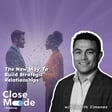
Fostering Confidence In Your Sales Team To Achieve the Impossible w/Stephen Oommen
In this episode, Brian Dietmeyer talks to Stephen Oommen, VP of Global Strategic and Enterprise Sales at Outreach, about the crucial role of confidence in selling. They delve into why confidence is often overlooked in sales discussions and explore its impact on both individual performance and team dynamics. This episode is a must-listen for sales professionals seeking to boost their confidence and enhance their effectiveness. Get ready for an insightful conversation that sheds light on the intersection of confidence, team synergy, and sales success, right here on CloseMode.
Timestamps:
03:42 Sales and sports have similar spirit of competition.
07:56 Success came when not driven by money.
09:48 Fortune 50 leadership experience, fear-based decisions.
14:12 Seller's confidence in ability to improve.
18:34 Reflecting on events with balanced perspective and response.
22:15 Confidence crucial in matching skills to job.
24:59 Vulnerability in communication and leadership for success.



















